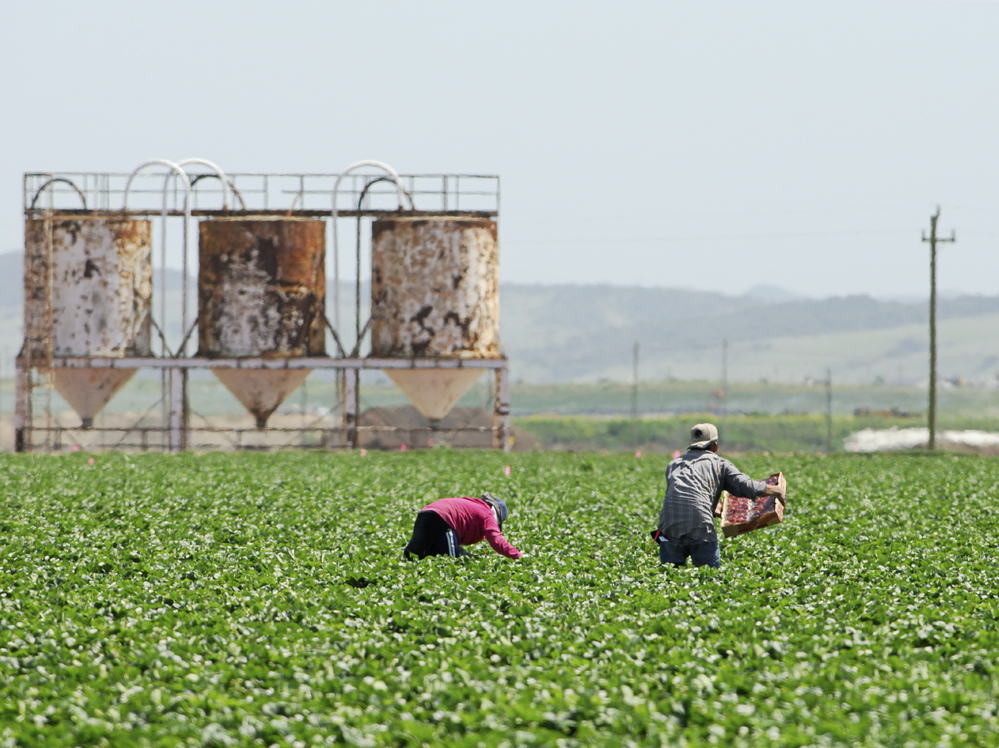 Enlarge image i
Enlarge image i Farmworkers like these in California picking produce may soon be required by the FDA to take more precautions against spreading foodborne illness.

Farmworkers like these in California picking produce may soon be required by the FDA to take more precautions against spreading foodborne illness.
UPDATED: 2:15 p.m. After a year of high-profile food recalls, the Food and Drug Administration released Friday two proposals designed to boost the safety of the nation's food supply.
One rule covers operations at fruit and vegetable farms, focusing on those that have been the subject of several recent recalls, like leafy greens and berries. They would require worker safety training and monitoring the presence of animals in the field that could spread illness.
The other would require food processors to develop and follow detailed plans for preventing contamination of their products.
"The rules go very directly to preventing the types of outbreaks we have seen," said Michael Taylor, FDA's deputy commissioner for foods, at a noon press conference.
A recall involving salmonella in peanut products in September eventually led to the shutdown of a Sunland Inc. facility for nearly a month. The company makes peanut butter and other related items for several major national brands, including Trader Joe's. And there have been a string of E. coli-related recalls this year involving Canadian beef.
The move comes two years after president Obama signed the Food Safety Modernization Act into law, giving the Food and Drug Administration broader power to require food facilities to develop food safety plans and new authority to recall tainted food.
Back when the bill was signed, consumer groups, many food manufacturers and public health advocates were hopeful that the Obama administration would move swiftly to put new rules in place to prevent foodborne illnesses. "We have a new course for food safety in America that's going to place prevention at the center," said Pamela Bailey, president and CEO of the Grocery Manufacturers Association, back in December 2010.
But the regulations reportedly sat at the government's regulatory review office for months. This prompted two nonprofits, the Center for Food Safety and the Center for Environmental Health, to file a lawsuit against the agency, alleging "unreasonably delayed regulations." FDA recently asked a federal court to dismiss the suit.
The FDA says it has devoted enormous time and resources to the development of the rules.
"Although FDA has been unable to meet the aggressive statutory timelines ... there is no indication that Congress believed that strict adherence to those timetables is more important than careful consideration and development of these complex regulations," the agency says in its motion.
Congress exempted the smallest farms those that sell less than $500,000 of produce each year and deliver most of it to local consumers from these regulations. But many small farmers are still worried that they will, in fact, have to follow the new rules, raising their costs.
Safety advocates, for their part, are concerned that the FDA will not require vegetable producers to carry out extensive and expensive testing of their products to detect harmful bacteria.
The Centers for Disease Control and Prevention says 48 million Americans are sickened by tainted food, 128,000 are hospitalized and 3,000 die each year.
Stay tuned right here and on All Things Considered tonight for more details on what the rules will mean for the food industry and consumers.
No comments:
Post a Comment